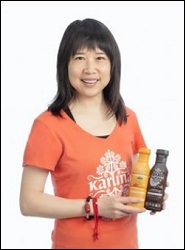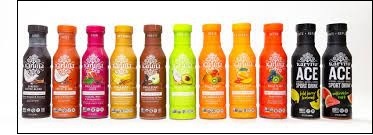Blending Passions
Karuna Wellness Drinks Founder and CEO Angela Zeng, Ph.D, MBA
 Growing up in Shenzhen, China, Angela Zeng learned
the “food-as-medicine” approach to staying healthy. When she moved
to the U.S. in 1996 for her Ph.D. in Pathology and then later on her
MBA, she noticed how the hectic culture and the ease of convenience
foods negatively affected people's health. Wanting to help people
make healthier choices, Angela founded Karuna
Wellness Drinks in 2017.
Growing up in Shenzhen, China, Angela Zeng learned
the “food-as-medicine” approach to staying healthy. When she moved
to the U.S. in 1996 for her Ph.D. in Pathology and then later on her
MBA, she noticed how the hectic culture and the ease of convenience
foods negatively affected people's health. Wanting to help people
make healthier choices, Angela founded Karuna
Wellness Drinks in 2017.
Angela's interest Chinese traditional medicine started when her mother took her to an herbal shop when she was 5 years old. She started collecting and experimenting herbal recipes from then on.
“My true passion really lies in traditional herbalism, the traditional medicine practiced in Asia for thousands of years. It’s not just limited to China. You see this in Japan, Korea, in Thailand, and many other countries in that region that we use food -- not just medicinal herbs-- to improve our own health, to prevent ourselves from getting sick,” explains Angela, “I try to combine the knowledge and my passion together to create this line, to make it almost like a lifestyle to inspire people to make better choices for their own health.”
“I don't mind showing off our Asian roots, our culture. I think there's a great amount, a great treasure, of what we have learned for thousands of years, about how you improve health and not use chemical compounds,” states Angela, “So I’m proud of all of that. I think it can be fused with Western culture pretty well and benefit consumers here.”
Using this knowledge, Angela developed a line that include juices, smoothies, and sports recovery drinks. There is even an alcohol-free wine alternative.
 By blending ingredients like mung bean sprouts with
tangerines and aronia berries, Angela has created beverages
containing ingredients that bring in health benefits like restoring
digestive health while also tasting good. “With each drink, I try to
choose a functional ingredient that kind of brings some health
benefit that I want to focus on,” says Angela. These benefits are
boosted even more since Karuna is whole plant-based. In other
products, the juices are often pressed from fruit and vegetables and
the rest is thrown out.
By blending ingredients like mung bean sprouts with
tangerines and aronia berries, Angela has created beverages
containing ingredients that bring in health benefits like restoring
digestive health while also tasting good. “With each drink, I try to
choose a functional ingredient that kind of brings some health
benefit that I want to focus on,” says Angela. These benefits are
boosted even more since Karuna is whole plant-based. In other
products, the juices are often pressed from fruit and vegetables and
the rest is thrown out.
“Basically, the reason I like to stick with the whole plant is that when you make a juice, this actually is super beneficial. For example the Joy-D juice includes the tangerine skin,” Angela explains, “It adds a little bit of flavor. In addition, it really provides lots of health benefits. Traditionally, [orange peel] is used to treat lots of respiratory issues in traditional Chinese medicine.”
Using vertical hydroponic farming to grow a number of their own ingredients, Karuna is able to ensure the quality needed for its juices with less of an impact on the environment. “I'm very environmentally conscious, for example, we're the first one probably so far to build an indoor hydroponic vertical farm to grow mung bean sprouts. When it’s well-designed, the hydroponic farm is a really simple design, you save anywhere from 70% to 80% of the water compared to traditional farming,” says Angela, “ And at the same time, because it’s a confined environment, you don't have to use pesticides or chemicals of any kind.” With such a winning combination of flavors and health benefits, Angela has been able to successfully expand into the wellness market.
Angela faced many challenges as an Asian woman when she launched the St. Louis-based Karuna. Naysayers questioned whether she understood consumer behavior, especially since she didn’t grow up here. And veterans in the beverage industry even told her to stick with what she knew best––the Asian market. If anything, those comments made Angela more determined to push forward. When asked about the challenges she faced as an Asian woman starting Karuna, Angela noted it was questioned whether an Asian woman would understand consumer behavior, especially not having grown up in the U.S. She was even told by veterans in the beverage industry that she should focus only on the Asian market. Instead of listening to them, Angela decided to push forward.
While she admits that there may be some gaps in knowledge and experiences to fill, "that doesn't mean we cannot make a successful business,” says Angela.
“There's always a bias in the society in terms of our role, who we should be. Instead of running a business, we should be the caregiver. And they seem to say that to be a good caregiver means that you won't have time to run your business,” Angela observes, “But at the same time, there are lots of good men out there. Are you saying that they’re good business persons, therefore, they cannot be good husbands? Nobody raises that kind of question, but that bias is in business.”
“Those biases will always be there and we
just have to find ways to show that it can be done.”
